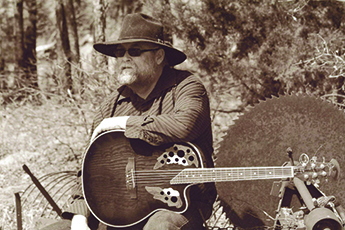Remember ‘Wichita Lineman’? Still on the Line, After Almost 50 Years
October 28, 2014
 |
Jimmy Webb, who wrote Wichita Lineman, says the lineman he saw at the top of a pole in Oklahoma’s panhandle was the “image of self-reliance in a country where too many people get excited only about celebrity and wealth.” |
I hear you singin’ in the wire, I can hear you through the whine
And the Wichita Lineman is still on the line.
The songs of legendary songwriter, singer and composer Jimmy Webb, whose first commercial recording was performed by the Supremes in 1965, evoke everyday people and universal themes.
In “Galveston,” a soldier in Vietnam cleans his gun wondering if he will live to come home. In “The Highwaymen,” a construction worker drowns in cement.
But none of Webb’s songs resonate more powerfully with workers, especially IBEW members, than “Wichita Lineman,” recorded in October 1968.
Rolling Stone lists the song, originally sung by Glen Campbell and covered by artists as diverse as Johnny Cash and REM at No. 192 on the magazine’s list of the “500 Greatest Songs of All Time.” James Taylor performed the song at the White House. Kool and the Gang recorded an instrumental version.
Billy Joel, who collaborated with Webb on the song in 2012, says the song is “about an ordinary man having extraordinary thoughts.”
In a 1997 article in the Dallas Observer, Webb says Glen Campbell had called him in 1968 and asked for another hit to follow Webb’s blockbuster “By the Time I Get to Phoenix.”
Webb had just returned to California from a trip to visit his family in Oklahoma. On a drive through the state’s panhandle near the Kansas border, he passed a seemingly endless line of telephone poles in the “shimmering mirage.”
“I was drivin’ along there, just blinkin’ and tryin’ to stay awake, and all of a sudden there was somebody on top of one of those telephone poles--out of thousands of telephone poles, there’s one that has a guy on it, and he had one of those little telephones hooked into the wires,” Webb said.
Webb says he didn’t know whether the lineman was “talkin’ or listenin’or doin’ something else with this telephone.” But the seeming loneliness of the man on the pole fused with Webb’s own angst leading to the now indelible line, “And I need you more than want you. And I want you for all time.”
Wichita Lineman hit No. 3 on the U.S. pop music charts and spent 15 weeks in the top 100.
“Jimmy Webb’s song hit the nail on the head about being away from my family working as a lineman,” says Tulsa, Okla., Local 1002 David Crary lineman and musician, who was quoted at length and sang the song on the British Broadcasting Company’s “Soul Music” radio show three years ago.
Webb, the son of an Oklahoma Baptist preacher, and Campbell were also interviewed on that show, which features versions of the song by Johnny Cash and British reggae artist Dennis Brown, who first covered the song at the age of 15.
Crary, a former Local 1002 assistant business manager, talks about working storm details in the swamps of Florida, swerving to miss alligators in the road. And he recalls the first time he heard “Wichita Lineman” in ’72 or ’73. The youngest of three brothers, Crary was sitting on a sleeping bag in the back of a station wagon during a family vacation when the song came on the radio.
 |
In an interview on BBC Radio, David Crary, a lineman and member of Tulsa Local 1002, said Wichita Lineman reminds him he is “working for the family back home” when he travels long distances for work. |
“I thought being a lineman has to be a cool job if you hear a guy singing about it on the radio,” says the father of six, who worked as a nonunion tree trimmer and underground utility worker before traveling to California to take a job as an IBEW-represented groundsman in 1996.
Crary has recorded his own song about linemen. It won applause when it was played for members attending a recent Seventh District progress meeting. But Crary says his respect for Webb only grew after he learned of Webb’s efforts to assist other songwriters. As vice chairman of the writer board of the American Society of Composers, Artists and Publishers, he fights for fair distribution of performance royalties and protecting copyrights.
“The song reminds me that the number one reason I am working is for the folks at home and they deserve for me to work safely and professionally,” says Crary.
Today, Glen Campbell, 78, is suffering from Alzheimer’s. Jimmy Webb, 68, who has produced music for Broadway, film and dozens of artists and a book on songwriting, is still performing.
The Dallas Observer’s Robert Wilonsky writes, “…The man wrote chord changes as though they were lines of poetry. He nonetheless regarded them as commercial garbage.”
While the song mixes the work of a telephone lineman talking on phone with that of utility lineman “searching for overloads,” the tune nevertheless resonates with everyone who climbs poles for a living, says IBEW Utility Department International Representative Don Hartley, a Richmond, Va., Local 50 lineman.
“It’s the song for all linemen. How many jobs have their own song?”
David Crary’s song about a tramp lineman, “The Ballad of Jason Jordan,” is available on his CD, “Outlaw Side,” available by writing to David at 850141 S. 3500 Road, Stroud, Oklahoma 74079. All proceeds from donations or sales of the CDs will be contributed to the Senior Citizens Center of Davenport, Oklahoma.
An exclusive interview with Jimmy Webb will be published in the December issue of The Electrical Worker.

|
 Related Articles
Related Articles

![]()